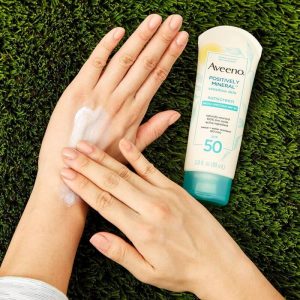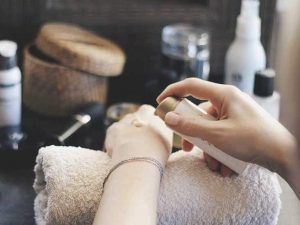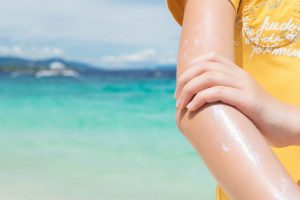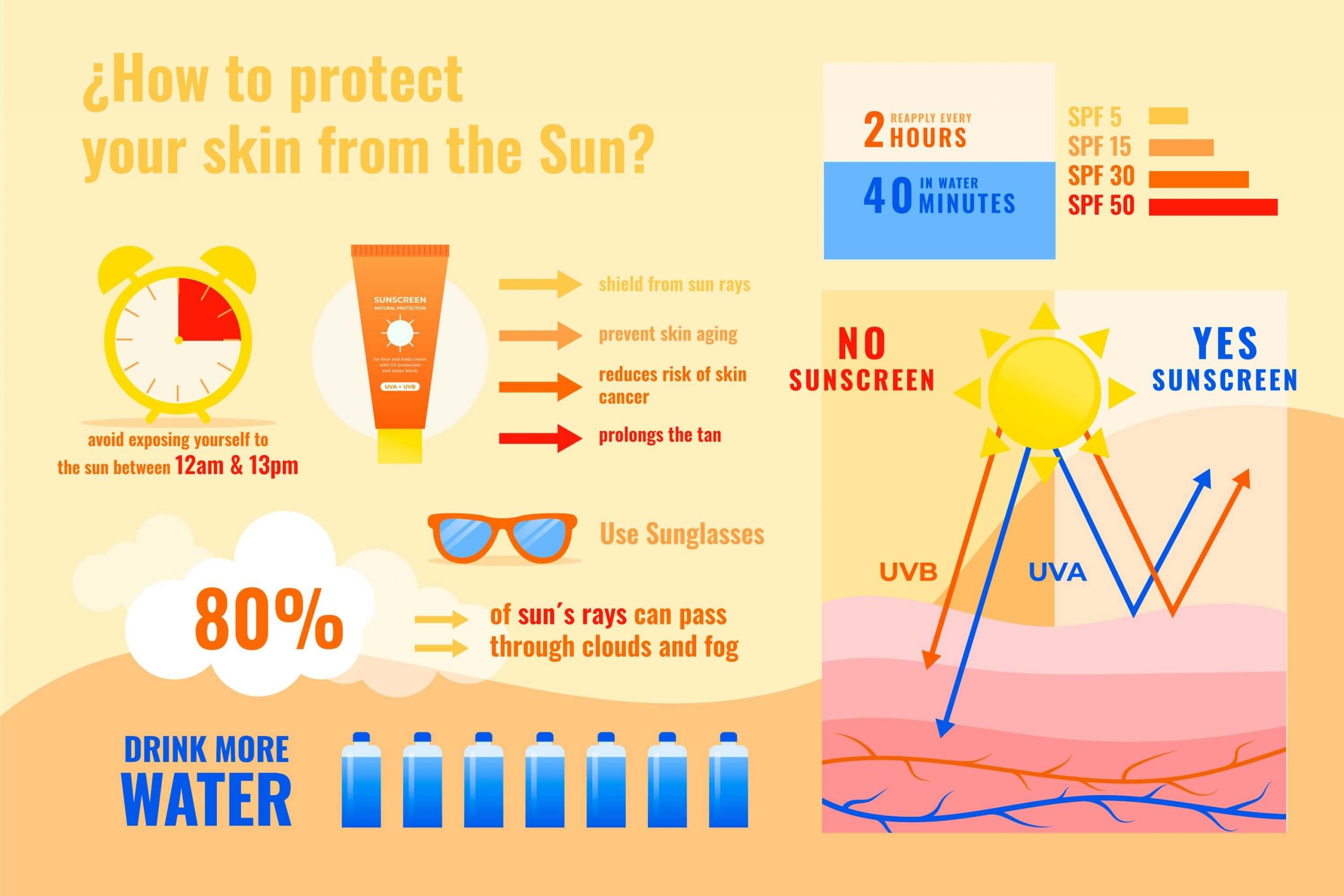The best sunscreens for sensitive skin are often overlooked, but interestingly, men with irritated skin are often the most ingredient-sensitive shoppers. They know that even the slightest irritating ingredient can cause hives, itching, sores, and rashes. When choosing a facial cleanser, they want one that exfoliates, avoids fragrance, and is easy to use. However, when it comes time to spend time at the beach, this does not matter, and we often end up using the sunscreen sold at the drugstore as is. It is good for preventing sunburn, but it can cause skin conditions to deteriorate for a week. For those who do, here are some sunscreen recommendations for men with sensitive skin.
The most important thing you need to know about sunscreens. Regardless of skin color, everyone 6 months of age and older should use sunscreen on exposed areas of skin when going outside (even on cloudy days). The second most important thing to remember is that any sunscreen is better than none. Ideally, however, one should use a product they trust to adequately protect their skin; CR’s reviews are helpful. We test sunscreens for their effectiveness against UVA and UVB rays. We also look at how well the Sun Protection Factor (SPF) listed on the product label matches the SPF of the tested sunscreen.
 Best Face Sunscreen For Sensitive Skin
Best Face Sunscreen For Sensitive Skin
SPF is a measure of a sunscreen’s ability to prevent sunburn caused primarily by ultraviolet (UVB) radiation. It generally represents the time it takes for a person’s exposed skin to burn with and without sunscreen. For example, if you would normally burn after 20 minutes of sun exposure without sunscreen, SPF 30 would theoretically protect you for 600 minutes, or 10 hours. However, once sunscreen is applied to the skin, it begins to break down and can also rub off. Therefore, it is necessary to reapply every two hours or immediately after swimming or sweating.
Also, the intensity and wavelength distribution of UVB varies from place to place, even during the course of the day. Finally, no sunscreen blocks 100% of sunlight. Distribution: SPF 30 blocks 97% of UVB, SPF 50 blocks 98%, and SPF 100 blocks 99%.
SPF does not also tell you how effective a sunscreen is against UVA; UVA rays penetrate deeper into the skin than UVB rays. These rays cause sunburn and skin aging and, along with UVB, cause skin cancer. unlike UVB, which is at its strongest between 10:00 and 16:00, UVA is present for as many hours as there are hours of sunlight. Therefore, you need to look for a broad-spectrum sunscreen that protects against both UVA and UVB. Here’s what Consumer Reports has to say about testing sunscreens and how to find the right product for you and your family.
Also Read: Body Whitening Soap for Dry Skin
Best Face Sunscreen For Sensitive Skin | Comparison Table 2025
Best Face Sunscreen For Sensitive Skin | Reviews 2025
1. EltaMD UV Clear SPF 46 Face
Product Overview
EltaMD UV Clear SPF 46 Face Sunscreen is a dermatologist-recommended product designed specifically for sensitive skin types. This lightweight, sheer, and silky sunscreen lotion is oil-free and contains 9% zinc oxide. Additionally, it is formulated with niacinamide and antioxidants to promote the appearance of healthy-looking skin.
Key Features
- Dermatologist-recommended: Trusted by dermatologists for sensitive skin.
- Broad-spectrum protection: Shields skin from harmful UVA and UVB rays with SPF 46.
- Lightweight and sheer: Provides a non-greasy, silky feel.
- Contains 9% zinc oxide: Offers effective sun protection.
- Formulated with niacinamide and antioxidants: Promotes healthy-looking skin.
- Dermatologist-recommended for sensitive skin types.
- Lightweight, sheer, and silky.
- Contains 9% zinc oxide and other key ingredients to promote healthy-looking skin.
- Non-greasy, fragrance-free, paraben-free, sensitivity-free, and noncomedogenic.
- Provides broad-spectrum SPF 46 coverage to protect the skin from harmful UVA and UVB rays.
- May not be suitable for very oily skin.
- May not provide sufficient hydration for very dry skin.
- May not be suitable for use on very dark skin tones due to the potential for white cast.
2. Vanicream Sunscreen Broad
Product Overview:
Vanicream Sunscreen Sport Broad Spectrum SPF 35 is a mineral sunscreen specially formulated for sensitive skin and an active lifestyle. It offers robust protection against UV rays and is ideal for those who engage in outdoor activities or have sensitive skin.
Key Features:
- Mineral-Based Protection: Utilizes non-nano zinc oxide, a physical sunscreen ingredient.
- Water Resistant: Provides up to 80 minutes of water resistance, perfect for activities involving sweating or water exposure.
- Free from Irritants: Contains no dyes, fragrance, masking fragrance, lanolin, parabens, or formaldehyde releasers.
- Non-Comedogenic: Designed to not clog pores, suitable for facial and body use.
- Hypoallergenic: Suitable for individuals with allergies or sensitive skin.
- Lightweight and Non-Greasy: Comfortable for all-day wear.
- Provides broad spectrum protection using non-nano zinc oxide.
- Suitable for sensitive skin.
- Free of potentially irritating ingredients like dyes, fragrance, lanolin, and parabens.
- Non-comedogenic, won’t clog pores.
- Water resistant for up to 80 minutes.
- Some people may not like the texture or appearance of zinc oxide on their skin.
- May not be as effective at protecting against UVA rays as some chemical sunscreens.
- May need to be reapplied more frequently if you are sweating or swimming
3. Cetaphil SheerMineral Liquid
Product Overview:
Cetaphil Sheer Mineral Face Liquid Sunscreen is a daily-use facial sunscreen that provides robust protection against harmful sun rays while being gentle on the skin. Formulated with 100% mineral sunscreen, it offers comprehensive care for your skin's needs.
Key Features
- Broad Spectrum SPF 50: Provides protection against both UVA and UVB rays.
- Ultra-Lightweight Formula: Applies easily and leaves a dry, matte finish.
- Non-Greasy: Ideal for use under makeup without clogging pores.
- Hypoallergenic: Suitable for sensitive skin.
- Fragrance-Free and Paraben-Free: Gentle and safe for daily use.
- Water-Resistant: Effective for up to 80 minutes in water.
- Dermatologist and Ophthalmologist Tested: Ensures safety for facial use.
- Provides broad spectrum sun protection with an SPF of 50.
- Lightweight and non-greasy formula that applies easily to the skin.
- Suitable for use under makeup.
- Hypoallergenic, fragrance-free, and paraben-free.
- Water-resistant for up to 80 minutes.
- May leave a white cast on the skin, especially if not applied in thin layers.
- Some users may find the formula too drying.
- Some users may prefer a chemical sunscreen to a mineral sunscreen.
4. Neutrogena Sensitive Skin
Product Overview:
Neutrogena Sensitive Skin Mineral Sunscreen Lotion with Broad Spectrum SPF 60+ is formulated specifically for sensitive skin. It provides comprehensive protection against harmful UVA and UVB rays, which helps prevent sunburn and reduces the risk of skin cancer and early skin aging when used as directed.
Key Features
- Broad Spectrum Protection: Offers high-level protection against both UVA and UVB rays.
- Water-Resistant: Effective protection for up to 80 minutes of water exposure.
- Hypoallergenic: Suitable for sensitive skin, free from fragrances and oils.
- Purescreen Technology: Uses a physical barrier to absorb, reflect, and scatter harmful sunrays.
- Non-Comedogenic: Does not clog pores, making it ideal for acne-prone skin.
- Provides gentle sun protection for sensitive skin.
- Made with 100% naturally-sourced physical sunscreen active ingredients.
- Hypoallergenic and free of fragrances and oils that may irritate sensitive skin.
- Contains Purescreen Technology to absorb, reflect, and scatter dangerous sunrays.
- Water-resistant and provides protection for up to 80 minutes.
- May not provide sufficient sun protection for extended periods of time, requiring reapplication.
- May not be suitable for use on damaged or broken skin.
- Ingesting the product can be harmful and medical attention should be sought if this occurs.
5. StriVectin Full Screen Broad
Product Overview:
StriVectin Full Screen Broad Spectrum SPF 30 Tinted Mineral Sunscreen is a specialized facial sunscreen designed to provide comprehensive protection and skincare benefits. It shields the skin from harmful UVA and UVB rays, pollution, and blue light, all of which contribute to skin damage and aging. This sunscreen is formulated with a blend of natural extracts and vitamins, offering nourishment and protection for the skin.
Key Features
- Broad Spectrum Protection: Guards against both UVA and UVB rays.
- Blue Light and Pollution Defense: Protects against environmental pollutants and blue light from electronic devices.
- Natural Extracts and Vitamins: Includes Vitamin A, Vitamin B, Vitamin C, Pro-Vitamin D, Turmeric Extract, and French Rice Germ for enhanced skin protection and nourishment.
- Reef Safe: Free from oxybenzone and octinoxate, ingredients harmful to marine life.
- NIA-114 Technology: Utilizes a patented form of Niacin/Vitamin B3 to strengthen the skin's moisture barrier.
- Provides broad spectrum protection against UVA and UVB rays.
- Formulated to defend against pollution and blue light.
- Contains a blend of natural extracts and vitamins to nourish and protect the skin.
- Formulated without oxybenzone and octinoxate.
- Reef safe.
- May not be suitable for all skin types.
- May not provide enough hydration for very dry skin.
- May leave a white cast on darker skin tones.
6. BLUE LIZARD Mineral Sunscreen
Product Overview:
Blue Lizard Mineral Sunscreen Sensitive SPF 50+ Spray is a broad-spectrum sunscreen designed to provide optimal protection against UVA and UVB rays. Trusted by dermatologists for over 20 years, this sunscreen is specifically formulated for sensitive skin, offering a gentle yet effective shield from the sun's harmful effects.
Key Features
- Broad-Spectrum Protection: Shields the skin from both UVA and UVB rays.
- Mineral Active Ingredient: Contains zinc oxide, avoiding chemical actives.
- Sensitive Skin Friendly: Free from parabens, phthalates, gluten, and alcohol.
- Water and Sweat Resistant: Provides up to 80 minutes of protection.
- Eco-Friendly: Ultra-low global warming potential and free from coral-harming Oxybenzone and Octinoxate.
- Easy Application: Dries clear for a convenient, mess-free experience.
- Provides broad spectrum protection against UVA and UVB rays.
- Formulated with mineral active zinc oxide and free from chemical active ingredients and harmful airborne titanium dioxide.
- Suitable for sensitive skin as it is free from parabens, phthalates, gluten, and alcohol.
- Enriched with nourishing botanical ingredients to soften and moisturize the skin.
- Water and sweat resistant, with up to 80 minutes of protection.
- Some users may not like the spray format of the sunscreen.
- May not be suitable for very water-intensive activities as it is only water resistant for 80 minutes.
- Some users may not like the scent of the sunscreen.
7. Eau Thermale Avene Solaire
Product Overview:
The UV Mineral Multi-Defense Sunscreen Fluid is a lightweight, multi-defense shield that provides robust protection against UV rays, pollution, and blue light. Designed for sensitive skin, it combines powerful sun protection with antioxidant benefits to improve skin tone and reduce visible redness.
Key Features:
- Broad-spectrum UVA/UVB protection
- 100% mineral filter
- Approved by the National Eczema Association and the Skin Cancer Foundation
- Oxybenzone and octinoxate-free
- Suitable for sensitive skin and marine environments
- Provides up to 200% more antioxidant protection
- Sheer, non-whitening formula
- Quick absorption
- Easy application
- Provides broad-spectrum UVA/UVB protection with a 100% mineral filter.
- Oxybenzone and octinoxate-free, suitable for sensitive skin.
- Approved by the National Eczema Association and the Skin Cancer Foundation.
- Provides up to 200% more antioxidant protection.
- Sheer, non-whitening formula that absorbs quickly into the skin.
- May need to be reapplied every two hours for maximum effectiveness.
- Some users may not like the texture or feel of the product on their skin.
- May be more expensive than other sunscreens on the market.
8. StBotanica Vitamin C SPF 30
Product Overview:
The StBotanica Vitamin C Sunscreen is a high-quality mineral-based sunscreen designed to provide comprehensive sun protection and skin nourishment. With an SPF 30 PA+++, it guards against both UVA and UVB rays, helping to prevent sun damage and premature aging.
Key Features
- Broad-Spectrum Protection: Offers defense against UVA and UVB rays.
- Vitamin C Infusion: Enriched with antioxidant-rich vitamin C to combat free radicals.
- Natural Extracts: Includes licorice, amla fruit, orange peel, tamarind seed, saffron, turmeric, rose flower, sandalwood, and vitamins C, E, and B3.
- Lightweight and Non-Greasy: Suitable for daily wear and comfortable under makeup.
- Water-Resistant: Stays effective even in wet conditions.
- Provides broad-spectrum protection from UVA and UVB rays.
- Formulated with a blend of antioxidant-rich ingredients.
- Lightweight and non-greasy, suitable for all skin types.
- Moisturizes and nourishes the skin.
- Water-resistant and free from harmful chemicals.
- May be too expensive for some users.
- Some people may not like the scent.
- May not provide sufficient sun protection for very long periods of intense sun exposure.
9. Vanicream Sunscreen Broad
Product Overview:
Vanicream Sunscreen Sport Broad Spectrum SPF 35 is a mineral-based sunscreen designed specifically for sensitive skin and active lifestyles. Its formulation ensures robust sun protection while maintaining a gentle approach to skin care.
Key Features:
- Broad-Spectrum Protection: Offers protection against both UVA and UVB rays using non-nano zinc oxide.
- Water-Resistant: Remains effective for up to 80 minutes in water.
- Hypoallergenic: Formulated to minimize the risk of allergic reactions.
- Provides broad spectrum protection using non-nano zinc oxide
- Suitable for those with sensitive skin and an active lifestyle
- Free of many potentially irritating ingredients
- Non-comedogenic, won’t clog pores
- Lightweight, non-greasy formula that is easy to apply
- Some people may not like the texture or feel of a mineral sunscreen
- It may leave a white cast on the skin, especially on deeper skin tones
- It may not be as effective at protecting against certain types of UV rays (such as UVA) compared to chemical sunscreens.
How To Choose The Best Face Sunscreen For Sensitive Skin | Ultimate Guide 2025
 What causes sensitive skin?
What causes sensitive skin?
Some people are born with sensitive skin, and studies have shown that this type is often inherited. For many people, the cause of sensitive skin is related to skin care. If you experience redness, burning, itching, or tingling after applying a product, your skin may be reacting to something listed on the ingredient list.
However, there are many factors that can irritate any skin tone. Think about whether anything has changed recently, such as a change in seasons, a change in skin care, a change in medications, or a change in laundry detergent.
The good news? Whatever the cause of sensitive skin, there are ways to protect and soothe irritated skin. Start by using gentle skin care products developed for sensitive skin. Avoid excessive cleansing, which dries out the skin, and excessive exfoliation, which aggravates skin irritation. When skin is irritated, limit skin exposure to protect it from UV damage.
Skin Care Habits for Sensitive Skin
It can be difficult to know what triggers sensitive skin. Now that you know what causes sensitive skin, use the skin care tips in this sample to get your sensitive skin back to its best.
Also Read: Best Wrinkle Cream For 30-Year Old
Avoid fragrance.
Choose fragrance-free products. The fragrance is a common contact allergen that can irritate the skin in delicate conditions.
Choose a gentle cleanser for daily use.
Choose a soap-free cleanser that cleanses without stripping the skin of its natural oils and balances the complexion.
Take care of your eyes
The sensitive skin around the eyes is thinner than the rest of the face. Look for gentle eye care products that nourish this delicate area. Thick, soft, moist makeup pads quickly remove makeup without irritating the eye area.
Also Read: Best Deodorant For Sweating
Use a strong but gentle moisturizer.
Even if it doesn't look particularly dry, sensitive skin likes to be moisturized. Pack your daily care routine with a moisturizing serum, moisturizer, or cream that soothes sensitivity. Hyaluronic acid is an effective moisturizer for all skin types. Incorporate this ingredient into your skin care regimen as a toner or mixed with a moisturizer containing hyaluronic acid to combat dry skin.
Sunscreen exposure.
To reduce UV damage and keep skin comfortable. Use sunscreen for sensitive skin or choose a moisturizer with built-in sunscreen to simplify your care.
Lifestyle Habits for Sensitive Skin
 In addition to changing your skincare routine, the choices you make every day can affect your complexion. Keep these lifestyle tips in mind to help you deal with sensitive skin
In addition to changing your skincare routine, the choices you make every day can affect your complexion. Keep these lifestyle tips in mind to help you deal with sensitive skin
Take short, not hot, showers with warm water to soothe the skin. Use mild soaps that do not contain perfumes or other fragrances, especially for red areas, open cracks, sores, and rashes.
It is also a good idea to know your food sensitivities. Keep a food diary and make note of any skin sensitivities that occur after eating certain foods, such as gluten, eggs, or dairy products.
If your skin sensitivity symptoms do not improve or if you suspect a more serious allergic reaction, consult your dermatologist or physician. In most cases, however, a little care can help you avoid skin irritation.
An almost invisible SPF that feels like a second skin may seem impossible in reality, but Everyday Humans proves that it is possible. This airy, lightweight SPF is also tinted, making it ideal for no-makeup days when you want to even out your skin tone and protect your skin at the same time.
Our tester has medium-toned skin with olive undertones, and this formula blended perfectly with her skin. We found this product to be effective in shortening the time it takes to get ready in the morning since there is no need to layer on the best foundation or powder. Also, if you don't like strong fragrances, please note that although it has a rose scent, it does not irritate delicate and sensitive noses.
Also Read: Best Body Scrub For Sensitive Skin
How to choose the best sunscreen cream for sensitive skin?
There are many factors to consider when choosing the best sunscreen for sensitive skin, but according to experts, here are two
Type of sunscreen:
There are two types of sunscreens: chemical and physical. Chemical sunscreens use chemicals such as octinoxate, avobenzone, and oxybenzone to absorb the sun's rays and convert them into heat, explains Dr. Chemical sunscreens should be applied to the skin 20 minutes before sun exposure in order to have a chance to be absorbed by the skin. In contrast, physical sunscreens (using ingredients such as titanium dioxide and zinc oxide) work by bouncing the sun's UV rays off the skin.
These sunscreens tend to be whitish, but modern formulations have advanced considerably and are more easily blended into the skin." Mineral sunscreens are the best solution for skin protection and health, while chemical sunscreens are a bit softer and more forgiving of makeup application." Ha says. They are also less likely to cause reactions and contact dermatitis than chemicals, so they are less irritating to sensitive skin, he says.
Ingredients
As with all skincare, ingredients play an important role in the look and feel of the skin. If you have sensitive skin, it is important to avoid certain ingredients that are known to irritate it. The term "fragrance" is a general term that includes essential oils and perfumes. This makes it difficult to determine exactly what ingredients are used and how the skin reacts to them," Ha points out. Fragrances in skin care products can cause allergic contact dermatitis, which appears as itching, redness, blotches, and scaly patches." Removing fragrance from sunscreens reduces the risk of developing contact allergies," says Dr. also advises looking for niacinamide, hyaluronic acid, and aloe vera, which soothe redness and inflammation. In general, for sensitive skin, look for a short list of ingredients.
Sunscreen Testing Methods
CR conducts testing in accordance with the testing protocols required of sunscreen manufacturers by the U.S. Food and Drug Administration (FDA). However, as with any product that meets government and industry standards, we use these standards as benchmarks and have developed our own methods to identify differences in performance and provide consumers with a comparative evaluation.
We test only sunscreens with an SPF of 30 or higher that are water resistant (40 or 80 minutes, the two times the FDA allows for water resistance labeling). In our testing, we buy sunscreens in stores as consumers do, preferably three of each product in different batch numbers.
In addition to evaluating the SPF of each sunscreen, we also test for SPF variability and UVA protection.
Our "Variation from SPF" score gives us important information. Using such a product means that the skin is not being adequately protected. For example, an SPF of 50 is less than half of the SPF label in our tests, but the maximum SPF is 24, sometimes even lower. (The American Academy of Dermatology recommends using products with an SPF of 30 or higher.) The meaning of the deviation of our SPF score is as follows
Excellent: tested at 85% or more of the SPF indicated on the label.
Very Good: tested at 70% to 84% of the SPF indicated on the label.
Good: tested at 60% to 69% of the SPF indicated on the label.
Fair: tested between 50% and 59% of the indicated SPF.
Poor: tested at 49% or less of the indicated SPF.
Also Read: Best Products For Cystic Acne
What’s in the sunscreen?
 Skin cancer is the most common cancer in the U.S., but the benefits of sunscreens are greater than the potential risks associated with their ingredients.
Skin cancer is the most common cancer in the U.S., but the benefits of sunscreens are greater than the potential risks associated with their ingredients.
However, there have been many disturbing reports about the health effects of the chemical active ingredients (UV-protectants) in sunscreens, such as oxybenzone and avobenzone. Some experts are concerned that these chemicals can be absorbed through the skin and lead to skin inflammation, hormone disruption, and even skin cancer. Recently, the FDA has requested additional studies on the safety and efficacy of these chemicals.
The FDA is not saying that these ingredients are unsafe. However, some chemical UV filters, such as octinoxate and oxybenzone, have been shown to cause hormonal changes in animals. Short-term studies in humans have not identified any adverse events.
Retinyl palmitate, an inactive component of a group of vitamin A-related chemicals called retinoids, has been shown in large-scale animal studies to be carcinogenic when exposed to light. However, this has not been studied in humans.
Taking pills containing another type of retinoid for acne or other skin conditions can cause birth defects. As a precaution, pregnant women should choose a sunscreen that does not contain retinol palmitate or retinyl palmitate. The active ingredients are listed in each sunscreen review.
CR experts state that there is compelling evidence that sunscreens protect against skin cancer and other harmful effects of sunlight. Therefore, consumers should continue to use them on exposed skin while scientists further investigate the safety of sunscreen ingredients.
Also Read: What Are The Best Sunscreens For Face
 Preventing sunburn
Preventing sunburn
Other sun protection measures can help reduce sunscreen use. Studies have shown that people who rely solely on sunscreen are more likely to burn than those who stay in the shade or wear long sleeves. Try to avoid the sun or stay in the shade during the hours of intense sunlight (10:00 a.m. to 4:00 p.m.) and dress accordingly. Wear a hat and dress well. If you hold your clothing up to the light and see through it, UV rays are also passing through.
If using sunscreen
Check the expiration date. Sunscreens are formulated to last at least three years, according to FDA regulations. Bottles older than that is not guaranteed to protect you. If the bottle or box does not have an expiration date and you do not remember the date of purchase, it is best to play it safe and buy a new sunscreen.
Shake it up.
It may not be in the instructions, but it's a good idea to do it because it helps distribute the active ingredients of the sunscreen throughout the product.
Use enough
CR tests have shown that halving the proper amount of sunscreen reduces the protective effect of SPF by about half. Apply sunscreen 15-30 minutes before going outside. For lotions, one shot glass (about 30 grams) is a good rule of thumb for covering the entire body with a bathing suit. One teaspoon for the face, head, and neck; one for the arms; one for the legs; one for the chest and belly; and one for the back and neck. For sprays, apply just enough to blend into the skin and repeat.
Don't forget the places that are often forgotten. These include the lips, back of the hands, back of the feet, back of the neck, scalp, and ears.
Also Read: Best Makeup Advice For Over 50
Reapply
Regardless of the type of sunscreen, reapply every two hours and immediately after swimming or sweating.
Spray-type sunscreens should be used with caution. The correct way to use a spray is to hold the nozzle 10-15 cm away from the skin, spray until the skin glows, then blend. Even if the spray says "do not rub," pressing it into the skin will increase its protective effect. Then repeat the process, just to be sure.
The FDA is investigating the dangers of inhaling spray sunscreens. Do not spray directly onto the face. Instead, spray the sunscreen on your hands and then apply it to your face. Children can easily inhale the mist, which can cause irritation to the lungs.
Consumer Reports recommends using lotions rather than sprays for children, but if you do use a spray, be very careful when applying it. It is best to spray it on your hands and rub it on your child's skin. At the very least, ask the child to close their eyes and mouth and turn their head while spraying. Finally, because the spray is flammable, allow it to dry before placing it near an open flame.
Also Read: Best Anti aging Skin Care Routine For 40s
Best Face Sunscreen For Sensitive Skin | Infographics

Best Face Sunscreen For Sensitive Skin | Video Explanation
FAQs
What Spf Do Dermatologists Recommend For Face?
Dermatologists generally recommend using a broad-spectrum sunscreen with an SPF (sun protection factor) of 30 or higher for the face. Broad-spectrum sunscreens protect against both UVA and UVB rays, which are the two types of ultraviolet radiation that can damage the skin and lead to premature aging and skin cancer.
It's important to note that the SPF rating only measures the level of protection against UVB rays, which are the primary cause of sunburn. However, UVA rays also contribute to skin damage and aging, so it's essential to choose a sunscreen that protects against both types of radiation.
Additionally, dermatologists may recommend choosing a sunscreen that is non-comedogenic, meaning it won't clog pores and cause acne. They may also suggest using a mineral-based sunscreen with ingredients such as zinc oxide or titanium dioxide, which sit on top of the skin and physically block the sun's rays, rather than being absorbed into the skin. This can be particularly beneficial for individuals with sensitive skin or those who are prone to breakouts.
Why Does My Face Burn When I Use Sunscreen?
Some people may experience skin reactions due to the interaction of UV rays with the ingredients in sunscreens. This is usually an allergy to the active ingredient, but it can also be a reaction to the fragrance or preservatives in the product.
What Spf Do You Use On Your Face Every Day?
It is best to stick to a sunscreen with SPF 30 or higher and apply 400 g to the entire face with a tool or visualization that is easy for you to use; SPF cosmetics, tinted moisturizers, and anything else should be considered an added bonus.
Is Spf 50 Good For Sensitive Skin?
SPF 50 can be good for sensitive skin, but it's important to choose a sunscreen that is specifically formulated for sensitive skin and does not contain ingredients that may irritate or cause an allergic reaction.
When selecting a sunscreen for sensitive skin, look for products that are labeled as "hypoallergenic," "fragrance-free," "non-comedogenic," and "non-irritating." You may also want to opt for mineral-based sunscreens that contain zinc oxide or titanium dioxide, as these ingredients are less likely to cause irritation or allergic reactions than chemical sunscreens.
It's important to apply sunscreen daily, even on cloudy or overcast days, to protect your skin from the damaging effects of the sun's UV rays. Be sure to apply enough sunscreen to cover all exposed areas of skin, and to reapply every 2 hours or after swimming or sweating. In addition to sunscreen, consider wearing protective clothing, such as a wide-brimmed hat and long-sleeved shirt, and seek shade during the hottest hours of the day to further protect your skin from the sun.
What Is The Safest Face Sunscreen To Use?
The safest face sunscreen to use is one that provides broad-spectrum protection against UVA and UVB rays and is formulated with safe and effective ingredients. It's also important to choose a sunscreen that works well for your skin type and concerns.
Generally, mineral-based sunscreens are considered safer than chemical-based ones, as they sit on top of the skin and physically block the sun's rays, rather than being absorbed into the skin. Ingredients such as zinc oxide and titanium dioxide are commonly used in mineral sunscreens and are generally considered safe and effective.
In addition to the type of sunscreen, it's important to look for a product that is labeled "non-comedogenic," meaning it won't clog pores and cause acne, and "fragrance-free," as fragrances can cause skin irritation.
Some examples of safe and effective face sunscreens that meet these criteria include:
- EltaMD UV Clear Broad-Spectrum SPF 46
- La Roche-Posay Anthelios Mineral Zinc Oxide Sunscreen SPF 50
- Neutrogena Sheer Zinc Mineral Sunscreen SPF 50
- CeraVe AM Facial Moisturizing Lotion with Sunscreen SPF 30
What Spf Is Recommended For Sensitive?
The recommended SPF (Sun Protection Factor) for sensitive skin is generally the same as for any other skin type, which is at least SPF 30. However, if you have extremely fair or sensitive skin, you may want to opt for a higher SPF, such as SPF 50, to provide even greater protection against the sun's UV rays.
It's important to choose a sunscreen that is specifically formulated for sensitive skin and does not contain potential irritants, such as fragrances or alcohol. Look for products that are labeled as "hypoallergenic," "fragrance-free," "non-comedogenic," and "non-irritating." Mineral-based sunscreens that contain zinc oxide or titanium dioxide are often a good choice for sensitive skin, as these ingredients are less likely to cause irritation or allergic reactions than chemical sunscreens.
Remember, sunscreen should be applied generously and frequently, at least every 2 hours, and more often if you are swimming or sweating. Wearing protective clothing and seeking shade during the hottest hours of the day can also help to protect your skin from the damaging effects of the sun's UV rays. If you have concerns about which SPF or sunscreen product is best for your skin type, you may want to consult with a dermatologist for personalized recommendations.
What Sunscreen Does The Cdc Recommend?
The Centers for Disease Control and Prevention (CDC) recommends using a broad-spectrum sunscreen with an SPF (Sun Protection Factor) of at least 15 to protect against the harmful effects of the sun's ultraviolet (UV) rays. However, they also note that using a higher SPF, such as 30 or higher, can provide even greater protection.
In addition to using a broad-spectrum sunscreen with an appropriate SPF, the CDC recommends applying sunscreen generously and frequently, at least every two hours, and more often if you are swimming or sweating. It's also important to wear protective clothing, such as a wide-brimmed hat and sunglasses, and seek shade during the hottest hours of the day (10am-4 pm) to further reduce your risk of sunburn and skin damage.
Remember, everyone's skin is different, so it's important to choose a sunscreen that works best for your skin type and needs. If you have concerns about which sunscreen product or SPF is best for you, you may want to consult with a dermatologist for personalized recommendations.
Which Sunscreen Is Best According To Dermatologist?
The best sunscreen according to dermatologists is one that provides broad-spectrum protection against both UVA and UVB rays and has an SPF of at least 30. It's also important to choose a sunscreen that is water-resistant, especially if you will be sweating or swimming.
In terms of ingredients, dermatologists often recommend mineral-based sunscreens that contain zinc oxide or titanium dioxide, as these ingredients are less likely to cause skin irritation or allergic reactions than chemical sunscreens. They are also effective at blocking both UVA and UVB rays.
Some popular brands of sunscreen recommended by dermatologists include:
- EltaMD UV Clear Broad-Spectrum SPF 46
- La Roche-Posay Anthelios Mineral SPF 50
- Neutrogena Sheer Zinc Dry-Touch Sunscreen SPF 50
- CeraVe Mineral Sunscreen Lotion SPF 50
- Blue Lizard Australian Sunscreen Sensitive SPF 30+
Remember, everyone's skin is different, so what works for one person may not work for another. It's important to choose a sunscreen that works best for your skin type and needs, and to apply it generously and frequently, at least every two hours, or more often if you are swimming or sweating.
Also Read: Best Lightweight Moisturizer For Oily Skin
Conclusion
Check reviews and look for the best sunscreens that have performed well in tests. If you can't find one, choose a sunscreen with chemical active ingredients and SPF 40 or higher, based on years of testing, which will likely ensure at least SPF 30. It is better to use sunscreen than not to use sunscreen, but it is only one of the smartest sun protection strategies.
This product was presentation was made with AAWP plugin.
 Cosmetics Capture is an online shop where you can find the best and certified Makeup, Beauty and Personal Care products For all genders.
Cosmetics Capture is an online shop where you can find the best and certified Makeup, Beauty and Personal Care products For all genders.